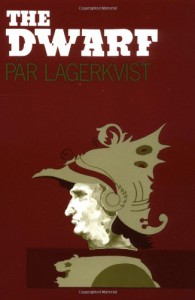Par Lagerkvist - The Dwarf

The Dwarf is a strange little book written by a Swedish Nobel Prize winner some time during WWII. It’s a rather allegoric story narrated by a dwarf living on the court in an unnamed Italian city probably in the 15th century, but actually all the hints point us in the same direction as Machiavelli’s Prince who was modelled on Cesare Borgia. In The Dwarf we also find Master Bernardo who is obviously Leonardo da Vinci (and who coincidentally also resided in Cesare Borgia’s court often.)
The plot is rather simple and fable-like, it consists of war, tragic romance and a plague, so really all your renaissance staples. The twist is our little narrator, though. He is so unabashedly evil and full of hate for almost everything and everyone, that I must admit I found it occasionally laughable. The unnamed dwarf finds excitement in conflict and battle. It’s only then that he can achieve a state that could be described as happiness. He takes no joy in food and finds the idea of sex absolutely repulsive. He is the agent provocateur and the catalyst for all the terrible decisions that the Prince (and some other characters) make. He schemes and plots always aiming for the worst possible outcome.
Of course, you don’t need a PhD in literature to figure out that this is all a metaphor for a little dwarf that lives inside all of us. That little creature that pushes us to do despicable things for the thrill of it (apparently). It’s what's little in us that really rules, the smallest and pettiest. It’s not even the sophisticated kind of Machiavellian evildoing; his outbursts are more like toddler tantrums – "I don’t understand it therefore I hate it and want it gone". Generally, it’s a rather sad summary of human condition but then it was written when it still looked like Hitler might win, so who could blame Lagerkvist for being a little disillusioned with the humanity.
Personally, I found this metaphor rather heavy-handed and not particularly original or thought-provoking. Someone at my book club mentioned that it was quite representative of Swedish (or Scandinavian in general) fiction not to strive for ambitious symbolism but settle for the very obvious. This, of course, is completely anecdotal so do not argue with me in the comments, but apparently it’s perfectly acceptable and apparently lauded even by critics (hence the Nobel Prize).
Having said all that, I must admit some of the paragraphs were quite amusing and I wish I could quote them. Alas, I read the book in its Polish translation and if I translated it to English now we would probably end up with something spectacularly different from what it was originally in Swedish. Overall, the narrator finds humans confusing and most of the time simply idiotic. His observations could be compared to those of a child trying to understand an adult world by herself or an alien trying to make sense of the life of on Earth. The Dwarf doesn’t understand why humans are convinced there is some greatness to life, he is bemused by how quickly people move between enthusiasm and joy and hopelessness and despair and he is forever baffled by the idea of physical love or any other kind of love for that matter. And what he doesn't understand, he hates. Simple as that.
And now, to wrap it up, let me get all PC on you. Was I really the only person made slightly uncomfortable by this idea that ‘dwarves’ are some sort different non-human species and representing all the evil inside all of us?
Yes, a metaphor of course. But if I were a little person reading this book, I think I would be pretty damn pissed off to be the butt of that metaphor. This was written during the reign of Hitler and let’s not forget what he had in store for people with disabilities.
 8
8
 1
1



